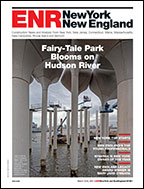An innovative, Texas-style highway contract will be put to the test as construction starts this month on the $1.02-billion DFW Connector project. It is designed to relieve congestion and double traffic capacity near the Dallas-Fort Worth International Airport.
The design-build contract for the job, a so-called Comprehensive Development Agreement, or CDA, was awarded by the Texas Dept. of Transportation (TxDOT) on Oct. 6, 2009 to NorthGate Constructors, a joint-venture consortium led by Kiewit Texas Construction, Fort Worth, and Zachry Construction, San Antonio. Under the CDA, the consortium will simultaneously design and build the new expressway complex starting on Feb. 15. The project’s first part must be done by 2014.
Since 2003, TxDOT has awarded CDAs for highway construction to private road builders who agree to invest their own money in return for the right to collect tolls for up to 50 years or more, usually in exchange for an up-front payment. By contrast, the CDA awarded to NorthGate will be funded entirely by public funds—$667 million in public gas taxes, $250 million in federal stimulus money and $107 million in bond proposals for right-of-way acquisitions.
In another departure from the norm, the DFW Connector project also has a small toll component, although it’s backed by public revenue. The tolled lanes will be built and owned by the state.
But these special contracts, which cover everything from minor construction projects to grand-scale, 50-year toll concessions, became controversial. Some opponents complained they limited competitive bidding and barred the state from building free roads that “compete” with toll roads. Others were angered by land grabs executed under eminent domain. Proponents countered that the contracts attract new money as well as those up-front concession fees.
In 2007, the Texas Legislature put the brakes on the arguments with the passage of Senate Bill 792, which imposed a two-year moratorium on CDAs. Under this, the general ability for TxDOT to award new CDAs expired in July 2009.
Private developers, meanwhile, are trying to circumvent the moratorium by using pass-through tolling, wherein the private entity collects the tolls from TxDOT. “TxDOT still allows private developers to get involved but under a different agreement,” says Joseph Dirik, an attorney with Fulbright & Jaworski, located in Dallas.
State law currently allows a regional mobility authority to enter into a CDA, Dirik says. But the state transportation code treats CDAs differently depending on whether they are entered into by TxDOT or a regional authority. For example, the regional authorities do not have an unlimited right to enter into CDAs. “While the arrangement for a pass-through financed road may look like a CDA, it is not the same,” Dirik says. But after 2011, traditional CDAs for both TxDOT and RMAs will need new authorizing legislation.
Gov. Rick Perry, who champions CDAs, tried to get state lawmakers to override the CDA moratorium last year. But after a contentious session, the legislators declined and exempted a number of projects in the pipeline, including the DFW Connector.



Post a comment to this article
Report Abusive Comment